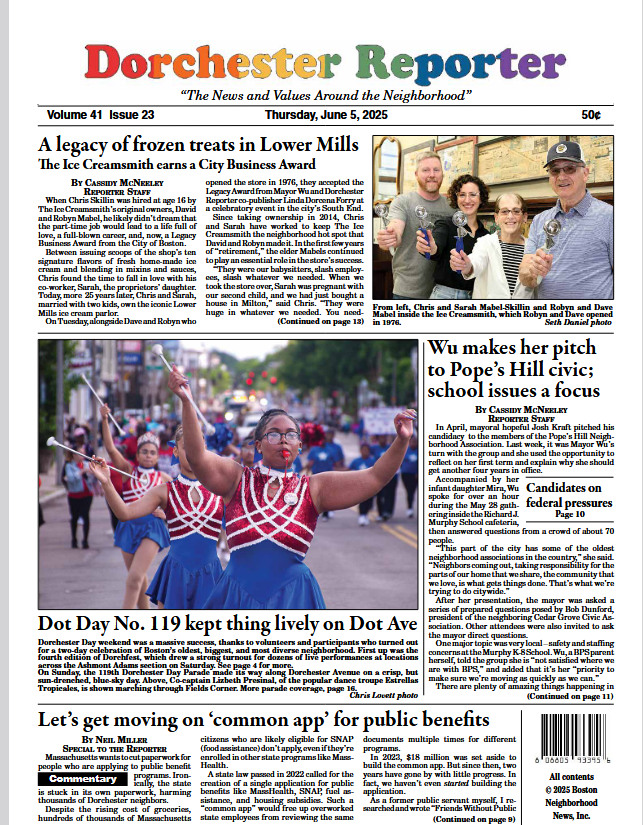I wrote about MA’s delays in building a common application for public benefits, in the Dorchester Reporter, one of Boston’s best neighborhood papers. Was pleasantly surprised that anyone would put a piece about procurement and state capacity on their front page! Many thanks to Bill Forry, the managing editor, for his help.
The letter I wrote is copied below. This is a much shorter piece than Friends without Public efits, on the same topic. Since the original article, Republicans have passed their bill to weaponize paperwork and kick millions off Medicaid and food stamps. For example, beneficiaries now need to verify their income and work status twice as often. States like Massachusetts need to fix their applications ASAP to avoid adding more stress for low-income families.
I highlight three suggestions for states who want to deliver better IT products: Hire talent directly into government; Slim down project management overhead in contracts; Reduce the paperwork required to submit a bid. What else would you add?
Let’s get moving on ‘common app’ for public benefits
By Neil Miller
Special to the Reporter
Massachusetts wants to cut paperwork for people who are applying to public benefit programs. Ironically, the state is stuck in its own paperwork, harming thousands of Dorchester neighbors.
Despite the rising cost of groceries, hundreds of thousands of Massachusetts citizens who are likely eligible for SNAP (food assistance) don’t apply, even if they’re enrolled in other state programs like MassHealth.
A state law passed in 2022 called for the creation of a single application for public benefits like MassHealth, SNAP, fuel assistance, and housing subsidies. Such a “common app” would free up overworked state employees from reviewing the same documents multiple times for different programs.
In 2023, $18 million was set aside to build the common app. But since then, two years have gone by with little progress. In fact, we haven’t even started building the application.
As a former public servant myself, I researched and wrote “Friends Without Public Benefits” to understand what’s taking so long. This isn’t about fraud – the $18 million is sitting there, unspent, so the only thing we’re wasting is time. There’s no political opposition slowing things down, either. Instead, the project is stuck in the bidding phase, waiting for a contract to be signed.
A request for quotes (RFQ) for this project has been open for seven months. Before that, it took a full year after money was set aside to release the RFQ. The normal way our government builds technology, by loading millions onto a complicated contract and turning responsibility over to the winning vendor, is just too slow.
We’re not building rockets here, though. Here are three ways Massachusetts can deliver results faster:
• Hire talent directly into government so we don’t need to outsource key responsibilities. The common application should be led by an experienced product manager who can stay focused on user needs and keep the tool from getting needlessly complicated. In tandem, a technical lead can build software and troubleshoot thorny data integration issues early on, so that the contractor isn’t starting from scratch. A product manager and technical lead would also slash contract costs by giving contractors clear guidance and stopping bad decisions before they waste taxpayer dollars.
• Slim down the contracts by trimming project management overhead. The seven-month-old solicitation lists three core activities. Two of them are for facilitating meetings and making documentation, vs. just one activity for actual software development. Even before the contract is awarded, contract evaluators need to read dozens of companies’ proposals for how they manage these administrative tasks, making the whole process longer than it needs to be. Any engineer will tell you that documentation is important, but the key goal of the contract – delivering a secure, reliable application for Massachusetts families – can’t get lost amidst these voluminous requirements.
• Reduce the paperwork required to submit a bid. Interested vendors need to submit a supplier diversity plan with their quote, detailing how they’ll pass at least one percent of contract sales onto certified small businesses. Doesn’t matter if a vendor is itself a small business, or that they’re already bound by supplier diversity plans submitted last year; your plan counts for 25 percent of the evaluation criteria for the solicitation. While supporting disadvantaged business owners is praiseworthy, it shouldn’t take priority over an accessible SNAP application for hungry neighbors. When state contracts move slower than molasses, it might be that the recipe calls for too many ingredients.
Massachusetts leaders rightfully oppose D.C. Republicans’ plan to cut benefits and add burdens for poor families. But there’s no one else to blame for how long a common application is taking. Let’s make life easier for MA families and deliver a working common application, even if it requires rethinking how the Commonwealth builds technology.
Neil Miller is a data scientist who previously worked on federal government procurement policy. He writes about government management here.
If you found this post helpful, please share it around! If you’d like to support this work financially, check out Buy Me a Coffee.




Awesome that you got your op-ed published! Congrats on a smart piece 👏